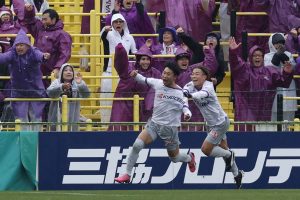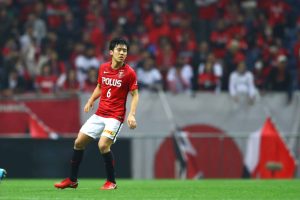
22-year-old Sota Kawasaki (left) has been the captain since last season / photograph: Atsushi Tokumaru
Can Kyoto Sanga’s 22-year-old captain Sota Kawasaki follow in the footsteps of Wataru Endo?
It was the number seven of Kyoto Sanga’s captain that silenced a packed Todoroki Stadium, filled with Kawasaki Frontale supporters.
After a goalless 65 minutes, Sota Kawasaki reacted quickest to Yuta Toyokawa’s shot and made a solid connection with his right foot, striking the ball sharply through the crowd of bodies in front of the Kawasaki goal to break the deadlock. The visitors held on to their lead to secure a much-needed first victory of the season.
The crucial goal was scored by the 22-year-old central midfielder, who coincidentally shares the same name as his team’s opponent that day. The Paris Olympic hopeful has mainly been used as an anchor with a reputation for his ball-winning ability, but this season he has been used as an inside-half, expected to be involved in the attack.
“I have set myself a target of five goals by the summer, aiming to score in every game,” he said. “But until now maybe I’ve been too conscious of that. I think I learned today that my focus should be to be competitive in basic things like defending and recovering second balls, then scoring goals should follow.”
Although Kawasaki is expected to contribute in attack, his main strength lies in defensive side, taking the ball away from the opposition and switching it quickly forward.
A native of Kofu, where Hidetoshi Nakata was also born, Kawasaki was groomed at the academy of his local side Ventforet Kofu in Yamanashi prefecture since primary school. But at high school age he sought further development and chose to train at the academy of Kyoto, which holds up nurturing both in academics and sports as a slogan.
After promotion to the first team in 2020, Kawasaki played some time in his first professional year and then seized a regular position in his second year under coach Cho Kwi-jae, playing 41 games and making a significant contribution to the team’s promotion to J1.
Last season, Kawasaki was appointed captain by Cho at aged 21. He is a strong leader of the team, showing excellent observation skills and strong leadership.
The man who gave Kawasaki and Endo the armband was manager Cho Kwi-jae
Cho, who is known for drawing out the potential of young players, previously selected a 19-year-old Wataru Endo as captain when he was in charge of Shonan Bellmare. The 55-year-old manager may have sensed the similar leadership quality in Kawasaki and Liverpool’s number three.
Surely the characteristics of the two players are different, especially in physique and mobility, but Kawasaki does share similarities with Endo in terms of the position, the ability to win the ball and the boldness to try vertical passes.
Having already been called up to the Japan national team last year (not made single cap yet though), Kawasaki is recognised as one of the best defensive midfielders in the J.League. Like many talented youngsters, the rather small midfielder (172cm / 5ft 6in) has a strong ambition to play at a higher level. Therefore it would be no surprise if he crossed the ocean soon.
And this summer Kawasaki could be seen by the eyes of the world. The stage is set for the Paris Olympics.
Kawasaki, who also plays a key role in the Japan U-23 national team under coach Go Oiwa, will likely become a regular member of the squad if they qualify for the Games.
The AFC U-23 Asian Cup, which also serves as a qualifier for the Paris Olympics, will be held in Qatar in April. This competition, which could determine his future, is an important target for Kawasaki.
However, the player himself does not believe that his position in the U-23 national team is secure.
A week before the Frontale match, Kawasaki had been experiencing a night of sleepless frustration after Kyoto fell to a 2-1 defeat to Shonan Bellmare. In that game it was Shonan’s Satoshi Tanaka, who is also competing for a place in the Olympic team, that opened the scoring.
“Tanaka scored against us and we were beaten quite badly. It was quite a tough week because I was reminded of that frustration before I went to bed.”
However, that experience then led to Kawasaki’s decisive goal against Frontale.
“I think it was very important for me to get that energy out today.”
The 22-year-old has used his frustration to achieve results, and while leading his team to victory as captain he has also spared no effort in his personal development. His attitude is reminiscent of Endo’s difficult days at Shonan when he bounced back and forth between J1 and J2. Will Kawasaki be able to follow in the footsteps of his great predecessor?


